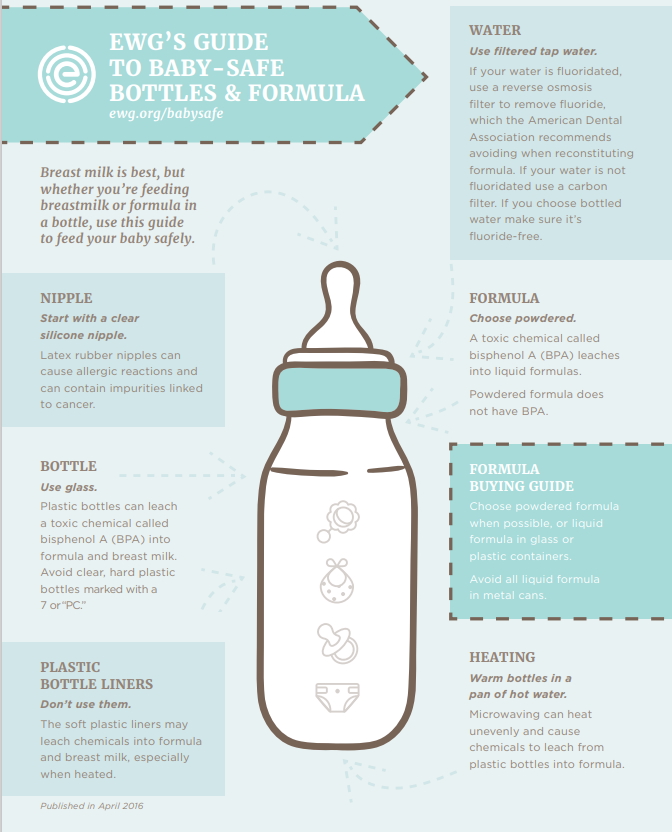General Baby Care Information
 Sometimes simpler is better, especially when it comes to caring for your infant.
Sometimes simpler is better, especially when it comes to caring for your infant.
If you want to avoid putting chemicals on your baby’s tender skin, head to the grocery store, not the drugstore, for your baby-care supplies. A few tried-and-true suggestions:
- Pure cornstarch, available in the baking aisle, makes excellent baby powder.
- Olive oil has long been used by mothers in the Mediterranean to keep their babies’ skin soft. Look for organic, cold-pressed light olive oil, which isn’t treated with chemicals and doesn’t have a strong olive smell.
- Pure castile soap is gentle enough to be used on babies’ skin and hair.
- Baking soda can help control diaper odors in the nursery; if you use disposable diapers, sprinkle some in the wastebasket after each charging.
Baby Bottles
When looking for a baby bottle avoid plastic liners and bottles with #7 or PC plastic since the plastic may contain bisphenol A (BPA) which could leach into your baby’s milk. Additionally, use a silicone nipple instead of rubber.
Bisphenol A (BPA) is a component of polycarbonate plastic (identifiable by the #7 in the recycling triangle), the clear, rigid variety of plastic from which many baby bottles are made. The chemical has come under increasing scrutiny, given studies showing that the substance mimics the hormone estrogen, meaning that it can duplicate, block or exaggerate hormonal responses.
Tests in lab animals have found that it alters reproductive organs and functions. It may have even more effects. The FDA is currently investigating the safety of this chemical. Canada is already moving to ban baby bottles containing BPA.
Baby Guide: Nursery:
Paint
You should stay away from harsh chemical fumes during your pregnancy, and so should your baby outside the womb. While lead is no longer a concern in new conventional paint, you should be concerned about volatile organic compounds (VOCs) — the toxic fumes that off-gas from common household items such as paint or a new vinyl shower curtain. Use low- or no-VOC paints and make sure the room is well ventilated.
Bedding
Mattresses are treated with polybrominated diphenyl ethers (PBDEs), chemical fire retardants that accumulate in our bodies and have been shown to affect the endocrine and nervous systems. (See Mattress Guide for more information). Organic cotton mattresses and natural wool ones are two green options. Bamboo or organic cotton sheets and blankets are environmentally sound and won’t irritate a baby’s sensitive skin.
Carpeting
There are a few issues with wall-to-wall carpeting that can affect a baby’s sensitive system. Carpets can harbor dust mites and allergens, and new synthetic carpets can off-gas VOCs.
Keep the baby’s room carpet-free and add an area rug for color and warmth. Carpet tiles are an eco-friendly option since they can be used as an area rug and the tiles can be individually cleaned when necessary. If you insist on the wall-to-wall carpet, go with one made of natural fibers such as wool, cotton, hemp, or jute. Look for a natural underlay to the carpet as well.
Furniture
Look for furniture made from certified sustainable wood or reclaimed materials. There are also companies that sell sturdy furniture designed to grow with your child. As with adult furniture, pressed-wood products made with resins and glues that often have high levels of VOCs should be avoided. Plastic is not the best choice for kids’ rooms. The material is made from petroleum and plastic items will likely end up in a landfill when you dispose of them. Sealants and paints should be nontoxic.
Toys
Soft organic cotton toys are an acute nontoxic alternative. Wooden toys are classics; look for wood that comes from FSC-certified forests and paint and finishes that are non-toxic (or toys that are unpainted).
Diapers
Dispose of diapers in a diaper pail or use a Diaper Service which is better for the environment.



